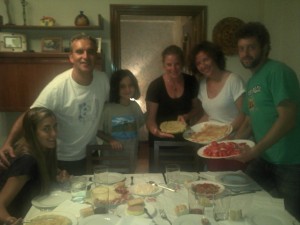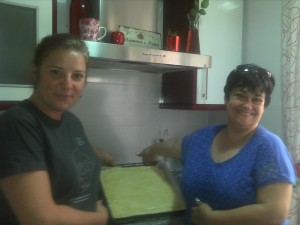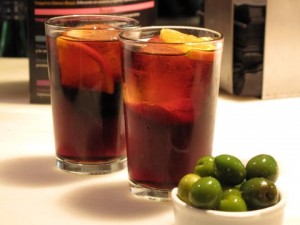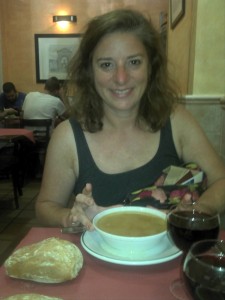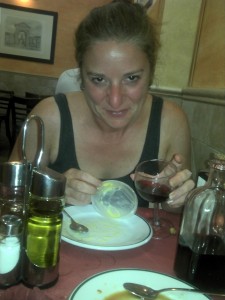I have a passion for Spanish food. I really think it must be in my blood, because it’s not like I grew up eating this stuff everyday.
Living in Madrid, I found it hard to believe how CHEAP things were. A draught beer at an outdoor cafe could run you 1 euro, a glass of wine is a little more. They like to mix their beverages here too: beer+lemon Fanta=Una Clara (or like an English style Shandy), wine+sugared club soda=tinto de verano. Don’t knock ’em till you’ve tried ’em. In this heat, anything cool and refreshing is welcome.
Drink is just the accompaniment to the food, of course. Chorizo and queso Manchego, which are not easy to find at home, are staples of dishes here. Chorizo is like the best sausage you’ve ever had, full of lots of spices and flavors. It can be eaten right off the stick or cooked into a dish or soup. There are lots of cheeses here, but when you say “queso” in Spain, it’s assumed your talking about Manchego. I like mine extra sharp.
I had decided to take a cooking class in Spain, but when I showed up for my first day, I was so appalled by the fact that one of the attendees didn’t even know how to beat eggs, that I beat it out of there quickly. Talk about not having any huevos…(that’s a Spanish joke/yolk for those of you in the know). (sorry, couldn’t resist the puns)
Instead, I made a deal with my friend Consuelo’s husband that, in exchange for him teaching me a few traditional Spanish dishes, we’d speak in English, so he could practice what he was learning in a class. I’m no dummy. I knew I got the better end of the deal.
So, that’s how I started Cooking with Jesus (Consuelo’s husband Jesus, that is). We made a bunch of delicious dishes, that if you haven’t tried them, well, if you’re lucky, I can be persuaded to cook them for you.
Spanish tortilla I grew up eating, but it’s a tricky potato, onion omelette that needs just the right proportions and consistency to get right. Apparently, you can no longer find a traditional tortilla in a restaurant in Spain, because now, after hundreds of years eating this dish, they’re afraid of salmonella or some such nonsense.Following were croquetas, empanadillas (small empanadas) and the very Madrileño pisto, which is a caramelized vegetable dish with peppers, onions tomatoes and zucchini. Throw in some bacalao (cod) dishes and a huge Galician style cod empanada that my other friend Gloria taught me how to make, and you’ve got one happy American!
Now, all this food I could eat more than made up for the food I wasn’t supposed to eat. The more time I spent in Spain, the more rules I discovered. The one that upset me the most was vermouth.
They have these incredible sweet vermouth bars with vermouth on tap. I know: dream come true. BUT, you could only drink vermouth before lunch, so even though I searched for a vermouth at 7pm, and even 1pm, no luck.Also, it seems that paella isn’t the only thing not eaten at night. I would innocently suggest something to eat, and looks of horror would cross my friends’ faces. Consuelo would go so far as to say, “We don’t eat that at night because it’s too FUERTE.” That’s too heavy, for us gringos and gringas. This does make sense, because the Spaniards eat dinner at around 9:30 or 10, so no one wants to go to bed with a stomach full of fried food. Some things just didn’t make much sense to me, though.
Lentils? Not at night.
Dessert? Depends on the person, but most men say “no”
Heavy meat? Need you ask?
Melon? Too fuerte. What, really? Melon?
Finally, I wanted to try Cocido Madrileño, a hearty dish that is just NOT eaten in summer, because it’s too FUERTE. But I was determined. The complete meal starts with the stock that the whole dish is cooked in. This is a meal in itself and so full of flavor, you want to cry with joy after tasting it. Then, the remaining ingredients follow on a platter: pork belly, chorizo, ham, onion, potato and one of the main ingredients: chick peas.
It was delicious, and I have the before and after pictures to prove it, but Consuelo was right after all!

